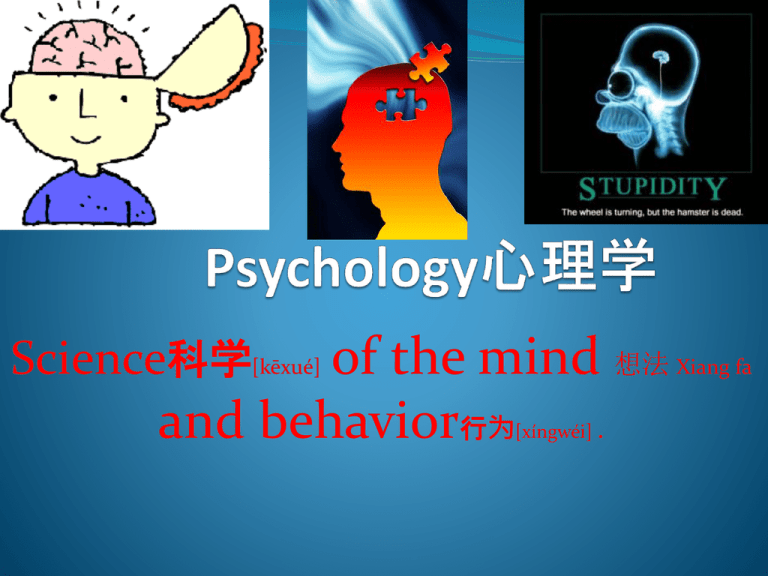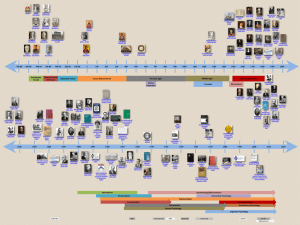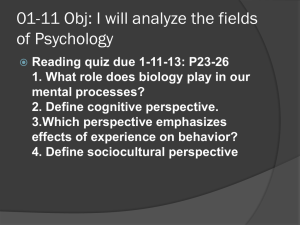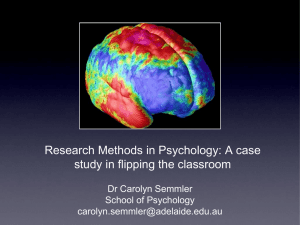
Science科学[kēxué] of the mind 想法 Xiang fa
and behavior行为
[xíngwéi] .
There are two kinds of psychology:
Clinical psychology 临床心理学[lín chuáng xīn
lǐ xué]
Helping 帮助[bāngzhù] people be happy and
healthy directly - face to face见面[jiànmiàn).
Helps people with problems.
Experimental psychology 实验心理学
[shíyànxīnlǐxué]
Doing research 研究 in psychology
A person that does psychology
Is called a “psychologist.”
DIALOG
Q: “What is your job?”
A: “I’m a psychologist.”
Q: What kind of psychologist are
you?
A: I’m a clinical psychologist.
Discussion
Which do you think is more interesting?
Clinical psychology 临床心理学 lín chuáng xīn lǐ xué OR
Experimental psychology 实验心理学 shíyànxīnlǐxué] ?
I think ________________ is more interesting.
I think both are equally interesting.
I think both are boring.
Sigmund Freud
(Clinical
psychology 临床心理学)
was the founder 创始人
of the modern
science of psychology.
He believed that people
are primarily主要地
[zhǔyàode] motivated士气高
涨的shìqìgāozhǎngde by
unconscious潜意识
qiányìshí forces.
[chuàngshǐrén]
(Clinical
psychology 临床心理学)
He thought that people…
Are motivated 士气高涨的shìqìgāozhǎngde
mainly by sex 性交xìngjiāo and
aggression 搏斗 bódòu.
More modern 现代 xiàndài
…psychologists 心理学家 believe people
are also motivated by things like:
Love
Transcendence 超然存在[chāo rán cún zài]
Hope 希望 xīwàng
Greed贪心 , fear 害怕, envy妒忌的
[tānxīn]
What motivates you?
Sex?
Aggression? 搏斗 bódòu; 侮
Money?
Love?
Transcendence? 超然存在[chāo rán cún zài]
Hope? 希望 xīwàng
Fear? 害怕
____________________?
(Clinical
psychology 临床心理学)
Freud also believed in
something called the “Ego” 自尊 zìzūn which are
your feelings about yourself.
If you have a big
ego, you think you’re so great.
If you have a small ego, you think you’re not good, stupid
笨的 bèn de, ugly 丑陋的 chǒulòu, worthless 毫无价值的 háowújiàzhíde.
He also believed in
Ego Defenses(防守)
Denial : 固执己见的
Rationalization 满肚借口
Projection 矛头指向他人的 (不从自身
找原因的 )
Passive aggression 爱莫能助
Dissociation 幻想成他人
Regression 想象自己是孩子
Withdrawal 逃避现实
Freuds Personality 个性 theory 个性
Freud believed we all have three personalities in us:
Id = Creative, selfish 自私的, childish 本我 běn wǒ
Ego = Conscious mind 清醒 qīngxǐng & 自尊 zìzūn
Superego = responsible, a parent-like self 超我
I am…
_______% childish 幼稚的 yòuzhì de
_______% adult 成年人 chéngniánrén
________% responsible 可靠的
like a parent 父母
fùmǔ
Freudian psychology is called
Psychoanalysis 精神分析学
In psychoanalysis
the therapist
治疗专家
[zhìliáozhuānjiā] helps
the client患者
[huànzhě] explore
their dreams 梦的
解释 and early
childhood
traumas. 童年期
创伤[tóng nián qī chuàng
shāng
Another branch of psychology is
Called: Transactional Analysis or T.A.
相互作用分析[xiāng hù zuò yòng fēn xī]
They believe:
I’m OK and
You’re OK!
And
everyone deserves respect尊重[zūnzhòng] .
T.A.
Parent: Controlling 控制
[kòngzhì] and authoritarian, can
be good or bad
Adult成年的: Realistic
现实的
balanced
不偏不倚的
[xiàn shí de]
Child: helpless, 眼睁睁
rebellious反叛的, selfpity自怜[zìlián]
T.A.
(Clinical
Part of being happy
and healthy in T.A. is
letting go of 松开
childhood games like
helpless, 眼睁睁,
rebellious反叛的,
self-pity自怜[zìlián], and
becoming
responsible可靠的 .
[sōngkāi]
kěkào de
psychology 临床心理学)
T.A.
Another part of T.A. is that you choose挑选
your own story. You don’t have to 甭[béng]
re-play重新比赛
old games, but can
make your own destiny命运.
[tiāoxuǎn]
[chóngxīnbǐsài]
(Clinical
psychology 临床心理学)
Another branch of psychology…
Humanistic Psychology is the 2nd major branch of
psychology. It started mainly with Carl
believed
Rogers who
1. people are basically healthy健康的 and
need
to develop their
2. full potential 十足潜力 and have a
3. self actualization need. 自我实现需要[zì wǒ shí xiàn
xū yào]
The love psychologist
What percent of your potential…
…are you using?
I use ____ % of my potential….
…at work
…in my social life
I use _____% of my physical potential.
I use _____% of my intellectual potential.
Why don’t you use a larger part of your
potential?
Another Humanist Psychologist
Was Abraham Maslow.
Pyramid
of needs
(Clinical
psychology 临床心理学)
The 3rd major branch of psychology
Is called behaviorism. 行为主义xíngwéizhǔyì
Behaviorists don’t believe in an
unconscious潜意识 (like Freud), or in a
need to develop full-potential 十足潜力
(like Rogers and Maslow). Behaviorists
only believe in learning. We are what we
learn. That’s all. Nothing more.
Behaviorists also don’t believe
In free will 自由意志论
zì yóu yì zhì lùn
Behaviorism is the most scientific 科学的
psychology.
There are 3 keys to learning:
Positive Reinforcement 阳性强化
[yáng xìng qiáng huà]
Negative reinforcement 负性强化[fù xìng qiáng huà]
Punishment 惩罚chéngfá
Schools use reinforcements
阳性强化 …
For example, if students do well on tests, they get good
scores, and go up to higher grades.
Life uses reinforcement
Be good get rewarded
Be bad get punished.
Discussion
(Clinical
psychology 临床心理学)
What do you believe?
1. Freudian psychology
(精神分析学
People are motivated by unconscious forces
1.
unconscious潜意识 qiányìshí forces.
2. Humanistic psychology
People have a pyramid of needs
2.
to fulfill potential.
3. Behavioral psychology:
Learning, i.e. rewards and
punishments control behavior
3.
Experimental psychology
实验心理学
…is about researching anything 任何事(!) that people do
or might do, anything 任何事 they think, or feel!
Why are some people kind 友好的 yǒuhǎo, and others cruel 残
酷 [?
What are some people highly motivated 士气高涨的
and others not?
What makes people buy 买 one thing and not another?
(marketing 销售 xiāoshòu)
* What makes one person attractive 万人迷 wàn rén mí but
not another?
Example: Are you a flirt?
调情
[tiáoqíng]
Do you make long eye-contact眼睛接触[yǎn jīng jiē chù]?
Smile微笑 wēixiào at strangers陌生人[mòshēngrén] ?
Get closer近的 than normal to other people?
Talk with strangers 陌生人?
If the answer to all four is “Yes” you are a flirt!
DO you flirt when your boyfriend or girlfriend is
there with you?
a. All the time!
b. Sometimes, if we’ve been arguing.
c. Never
•
http://www.betterlovetests.com/quiz-flirting.html
Experimental psychologists
Study ANYTHING, and EVERYTHING!
For more information see
+Psychology Today magazine
http://www.psychologytoday.com/magazine
Psychopathology疯人[fēngrén]
= Mental illness
抑郁症 yìyùzhèng
The problem roots in her depression.
问题的根源在于她的抑郁症。
* Bipolar disorder: 躁狂抑郁症,指一
种感情上的混乱,特征是时而发狂,
时而抑郁
* Depression:
Psychopathology = Mental illness 2
Neurosis: 神经官能症
她的行为表明,她患有严重的神经衰弱症
Her behavior points to a severe neurosis.
Psychosis: 精神病,精神错乱,精神失常
自省力低下会增加非情感性精神病人病情复发和再
住院的可能性
Poor insight increases relapse and re-admission to
hospital in people with non-affective psychosis.
Psychopathology 3
Attention Deficit Disorder 注意力缺
乏症,指人,尤指儿童,不能长时间注
意力集中,导致学习障碍和许多行为问
题的一种病症常用缩写是‘ADD’
Split personality 人格分裂[rén gé fēn liè]
Sociopath: 反社会者[fǎn shè huì zhě]
Psychopathology quiz
A client tells you he or she has been very, very sad for a
long, long time. Answer:
(Depression)
Psychopathology Quiz
Sometimes he’s so extremely happy, then extremely
sad. He has wild mood swings. 他的情绪起伏不定
Answer:
Bipolar illness
What is this?
What’s this?
Thinks people are always watching or wants to hurt
him or her, but it’s not real.
Paranoid
偏执狂,
妄想症
Psychotic
精神病的,患精神病的
Neurotic
神经官能症
Addiction 瘾[yǐn]
PMS
(not mental illness!)
Up to 40 per cent of women have
premenstrual syndrome (PMS),
including mood swings, bloating, food
cravings and pain.
多达四成的妇女深受经前综合症之苦,这些引起
体内紊乱的症状包括情绪不稳、肿胀、嗜食和疼
痛。
PMS
Some of my favorite books about
psychology
“In and out of the garbage pail” by Fredrick S. Perls
“The further reaches of human nature” by A. Maslow
“Beyond freedom and dignity,” by B.F. Skinner
“I’m OK, you’re OK” by Thomas Harris
“The basic writings of Sigmund Freud” by S. Freud
“The interpretation of Dreams” by Sigmund Freud
“Memories, Dreams, Reflections” by Carl Jung
This is just the ABCs of
Psychology
I hope you found it
interesting!









